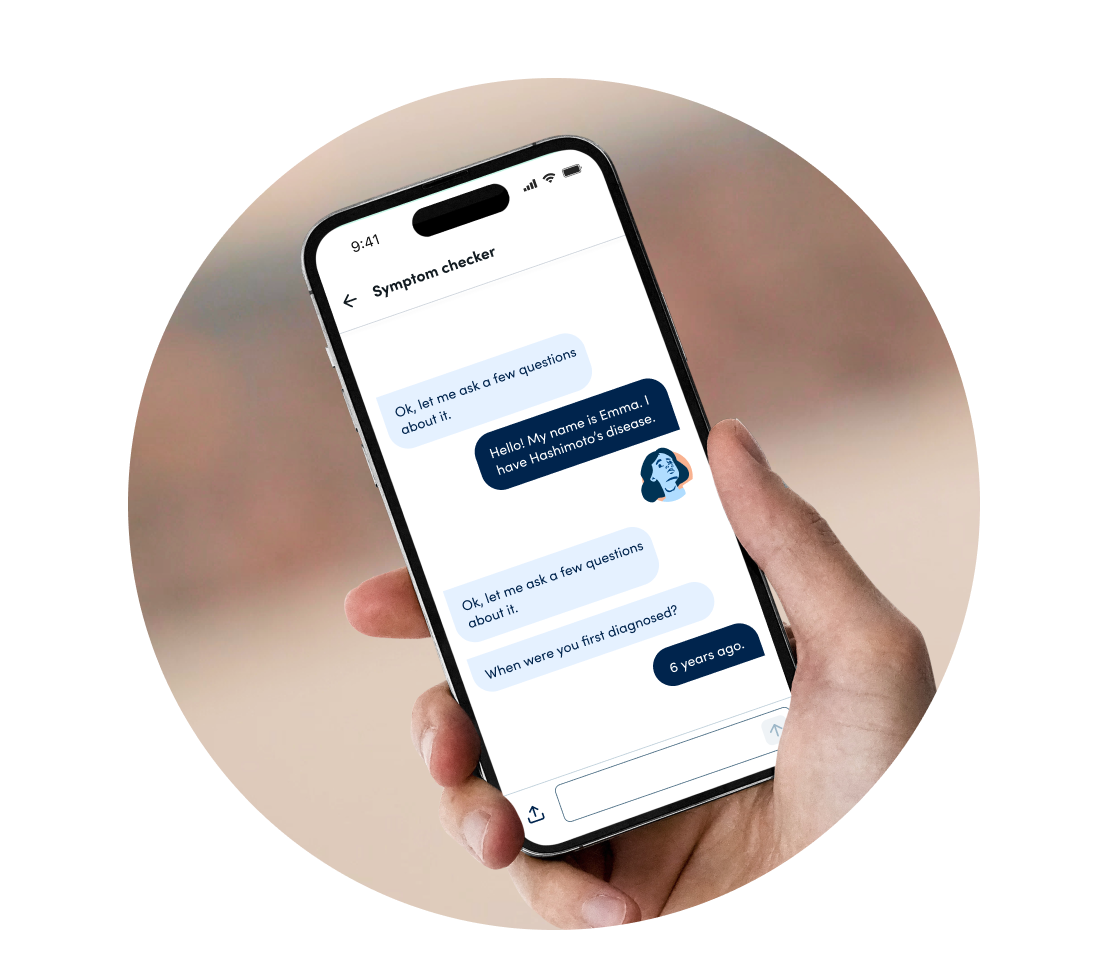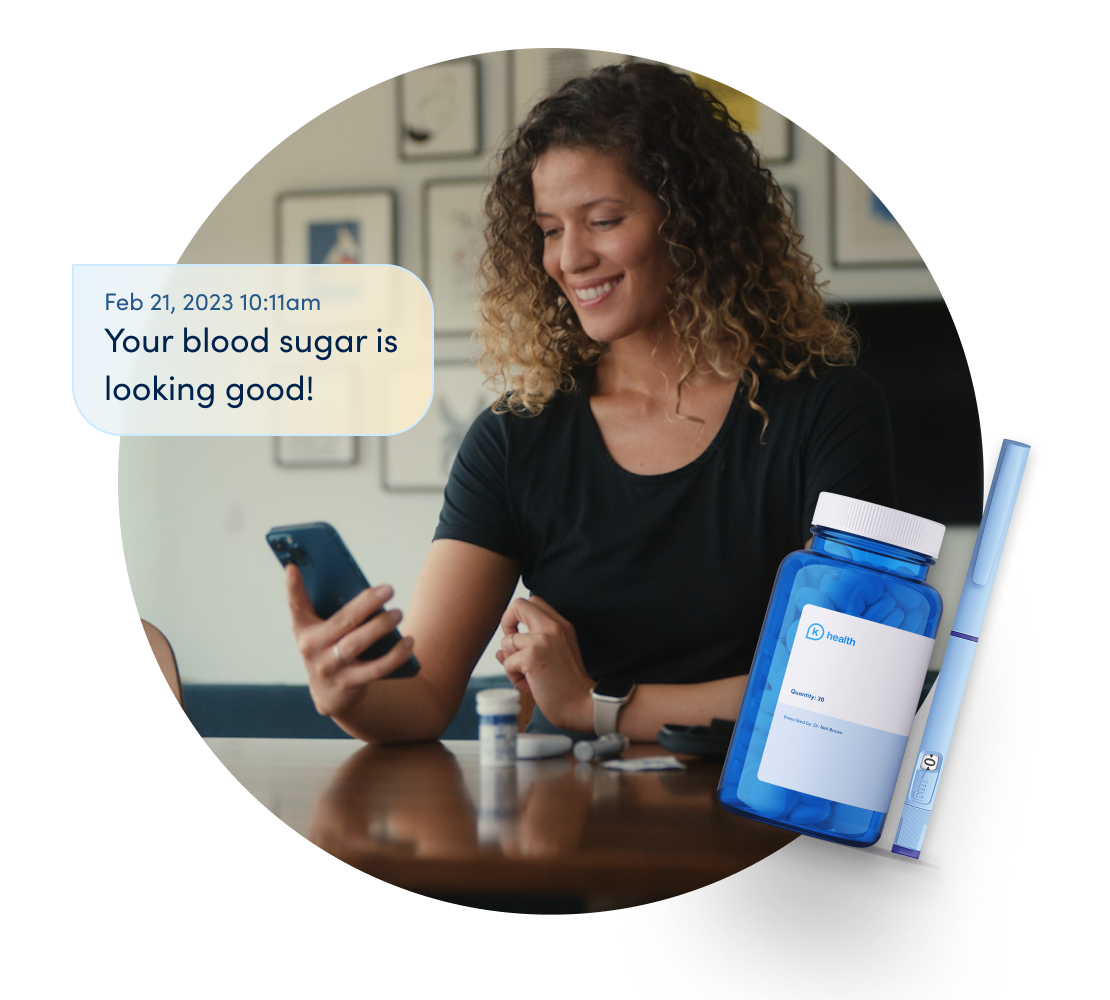GET DIABETES TREATMENT ONLINE
Chat with a medical provider without leaving your house and manage diabetes and medications for only $49 for your first month.
HOW IT WORKS
Diabetes management made easy

Tell us about yourself
Our smarter, faster, virtual intake process gets your doctors the info they need to care for the whole you.

Get care on your schedule
Text us when you’re free—we make ourselves available day and night. For virtual check-ins, refills, and more.

Manage your health with ease
We’ll help you stick to your plan for managing a chronic disease*, changing a habit, and living healthier—by phone.
WHAT WE TREAT
Integrated care for the whole you
-
Chronic heartburn or GERD
-
Migraines
-
Gout
-
Asthma
-
Type 2 diabetes
-
High cholesterol
-
High blood pressure
-
Hypothyroidism
and hundreds more chronic and urgent conditions
READ MORE
Diabetes Treatment Online FAQs

What is diabetes?
Diabetes is a chronic medical condition that occurs when your blood sugar level, sometimes called your blood glucose, is too high for an extended period of time. Sugar is what your body uses to create energy, and it is needed by every cell. However, having too much sugar in your blood can cause chronic damage to your blood vessels, nerves, and internal organs.
During digestion, your food is broken down into nutrients (including glucose) and is absorbed into your bloodstream. As your blood glucose level rises, your pancreas releases the hormone insulin. Insulin then tells your cells to absorb the blood sugar. However, if your body fails to release enough insulin, or if your cells fail to recognize insulin’s signal to absorb the blood sugar, your blood sugar levels can remain high. If this happens for an extended period of time, you may develop diabetes.
Prediabetes
Prediabetes, sometimes known as insulin resistance, happens when your body is not responding to insulin as it should. This means your blood sugar is higher than a healthy level, but not as high as it would be with diabetes itself. Often there are no symptoms of prediabetes. However, if caught early, a person with prediabetes can prevent the progression to type 2 diabetes by changing their diet and lifestyle.
Several factors put a person at higher risk for prediabetes:
- Overweight or obese
- Age 45 or older
- Having a parent, brother, or sister with diabetes
- Being part of an ethnicity at higher risk; specifically, African American, Latin American, Native American, or Asian/Pacific Islander
- Not getting regular physical activity
- Having a history of gestational diabetes
- Health conditions such as high blood pressure, abnormal cholesterol, or heart disease
- Having polycystic ovarian syndrome
If you fall into the high-risk category, talk with your medical provider about testing for prediabetes.
Type 1 diabetes
Type 1 diabetes is when a person’s immune system attacks and destroys the cells in the pancreas that make insulin. Without insulin, your cells do not take in sugar from your blood, and your glucose levels rise to an unhealthy level. To stay alive, people with type 1 diabetes must take insulin daily.
Type 1 diabetes is more frequent in children and young adults, although it can appear at any age. People with a parent or sibling with type 1 diabetes are at higher risk for developing this autoimmune disease. Although the exact cause is unknown, researchers believe several factors, such as genetics and the environment, may trigger the disease.
Type 2 diabetes
The most common type of diabetes is type 2 diabetes. It occurs when your body stops making enough insulin or your body does not respond well to the insulin it makes. This results in high blood sugar.
Anyone at any age can develop type 2 diabetes. However, it most often occurs in people who are over the age of 45, have prediabetes, are overweight or obese, have a family history of diabetes, have had gestational diabetes, or who are physically inactive. The good news is that with early recognition of the disease, you can take steps to prevent or slow its development.
Gestational diabetes
Gestational diabetes is a type of diabetes that sometimes occurs during pregnancy. It usually develops during the 24th and 28th week of pregnancy. Gestational diabetes can have an impact on your own health as well as the health of the baby. Learning how to manage it will help you both stay healthy.
Symptoms of diabetes
Depending on the type of diabetes, symptoms may slowly appear over time, or as with type 1 diabetes, the symptoms may occur suddenly. People with prediabetes typically do not have symptoms.
Symptoms may include:
- Increased thirst and urination
- Feeling fatigued
- Increased hunger
- Blurred vision
- Numbness or tingling in the hands or feet
- Wounds that heal slowly
- Unexplained weight loss
- Irritability
- Frequent infections
What causes diabetes?
Experts do not know the exact cause of diabetes. However, they believe it to be a combination of factors such as genetics, lifestyle, and environmental factors such as getting sick with a virus. These causes vary based on whether you have Type 1 or Type 2 diabetes.
Type 1 diabetes occurs when the immune system attacks the pancreas and destroys the cells that make insulin. Type 1 diabetes is an autoimmune disease that is likely triggered by genetics or an environmental trigger, like a virus.
Prediabetes, type 2 diabetes, and gestational diabetes occur when the body is not making enough insulin or is not responding well to insulin. Type 2 diabetes is often caused by lifestyle factors (like physical inactivity and an overweight or obese status) and genetics.
Tips to prevent diabetes
Because type 1 diabetes happens due to an autoimmune response, there is no clear way to prevent it. Genetics and age are also risk factors that can’t be changed. However, making lifestyle and diet changes may help you prevent prediabetes, type 2 diabetes, and gestational diabetes.
Lifestyle changes may include:
- Getting more physical activity. Experts recommend at least 30 minutes of moderate-level physical activity five days a week. If you haven’t been exercising, talk with your medical provider about how to start exercising safely.
- Maintain a healthy weight. If you are overweight or have obesity, you may help lower your risk for diabetes by losing weight. Talk with your medical provider about the best way to start losing weight.
- Eat a balanced diet. Learn to eat smaller portions and focus on eating foods high in fiber and protein. Limit foods high in sugar and carbohydrates.
How is diabetes managed?
Managing diabetes is a combination of managing your overall health through diet and exercise and sometimes taking diabetes medications or insulin. Several medications are available to help manage your blood sugar levels. You will also need to learn how to check your blood sugar level throughout the day.
Part of managing diabetes is also monitoring for and preventing complications of diabetes. You can do this by monitoring your blood pressure, cholesterol level, and if you’re a smoker, starting a smoking cessation program. These steps will help reduce your risk for heart and kidney disease and complications such as heart attack, stroke, and kidney failure.
Is diabetes genetic?
Type 1 diabetes has a genetic component, particularly in populations of identical twins, but the genetic ties are less strong than once thought—many people with type 1 diabetes do not have an immediate relation with the disease. However, type 2 diabetes is strongly linked to family lineage and history. Race can also play a role. Those who are African American, Native American, Asian American, Hispanic/Latino, or Asian/Pacific Islander are at higher risk of developing diabetes.
Can it be reversed?
Because of permanent damage to the pancreas by the immune system, type 1 diabetes is not reversible. However, good management of type 1 diabetes may prevent further complications.
Following a healthy lifestyle and learning which foods to eat and which to avoid may help you reverse or slow the progression of prediabetes and type 2 diabetes.
How can an online medical provider help manage diabetes?
K Health offers a wide range of services, including help with managing your diabetes. Seeing a K Health medical provider will help you with:
- Disease management
- Learning more about your condition
- Monitoring your glucose levels
- Filling prescriptions and refills
- Changing your medications or dosages
- Follow-up checkups
Most of the time, you can manage your diabetes without in-person visits. However, if your K Health medical provider feels it necessary, they will suggest that you see a doctor in person.

Your K Health unlimited membership includes:
-
24/7 text-based Urgent Care
-
Flexible appointments for ongoing care
-
Low-cost generic meds delivered to your door

Avoid the stressful search for care
Join primary care
Frequently asked questions
Recommended content
All articles
